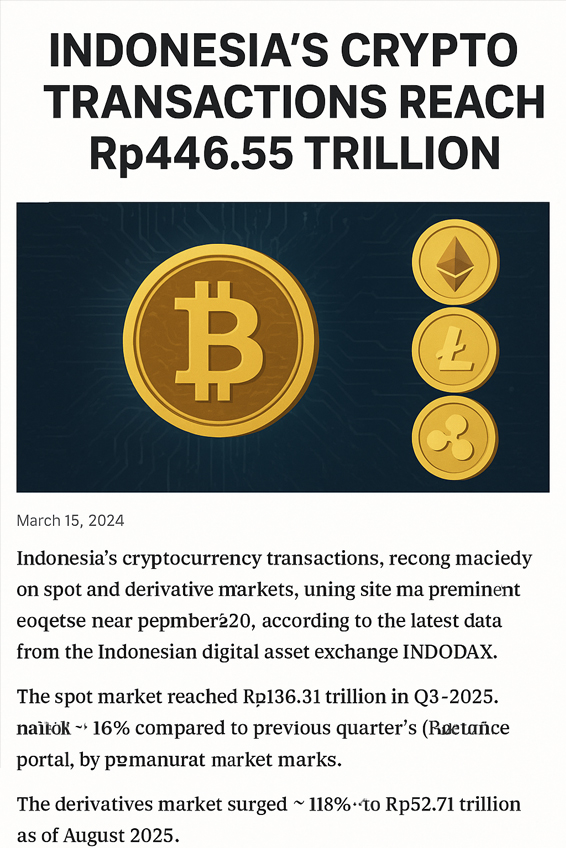Premium Biz Post – In a striking testament to the country’s growing enthusiasm for digital assets, Indonesia’s crypto by September 2025. This milestone reflects both the surging interest of local investors and the rapid expansion of Indonesia’s digital financial infrastructure. As blockchain technology becomes increasingly mainstream, the nation stands out as one of the most dynamic crypto markets in Southeast Asia.

Indonesia’s Position in the Global Crypto Landscape
Indonesia, with its vast population of tech-savvy youth, has consistently ranked among the top countries in cryptocurrency adoption. Recent data from INDODAX, one of the country’s largest crypto exchanges, revealed that over 18 million Indonesians now own or trade digital assets. This number represents a significant increase compared to previous years, where crypto trading was still viewed as a niche investment trend.
Globally, cryptocurrency markets have seen volatile swings in 2025, with Bitcoin hovering between $55,000 and $65,000, and Ethereum maintaining an average range around $3,000. Despite these fluctuations, the Indonesian market has remained resilient, with trading volumes showing consistent growth. Analysts suggest that Indonesia’s long-term commitment to digital transformation and fintech innovation has played a pivotal role in sustaining investor confidence.
The rise in transactions can be linked to improved accessibility — many Indonesian crypto platforms now integrate with local e-wallets, making deposits and withdrawals seamless. Additionally, increasing educational outreach from both the private sector and government has encouraged more retail investors to explore blockchain assets.
Spot and Derivative Markets on the Rise
According to the INDODAX report, the crypto spot market accounted for Rp136.31 trillion in Q3 2025, marking a 16% increase compared to the previous quarter. The derivative market, on the other hand, experienced a remarkable 118% surge, reaching Rp52.71 trillion. These figures highlight a growing sophistication among Indonesian traders, many of whom are now exploring futures and options to hedge against price volatility.
The derivative segment’s rapid growth underscores a maturing investor mindset. Where earlier participants focused primarily on buying and holding assets, today’s traders employ more complex strategies to optimize profits and manage risks. This evolution reflects Indonesia’s growing alignment with global trading behaviors observed in markets such as Singapore, the U.S., and South Korea.
Another contributing factor is the expansion of regulated exchanges in Indonesia. The government, through Bappebti (Commodity Futures Trading Regulatory Agency), has implemented stricter compliance rules to ensure investor protection and market transparency. These efforts have boosted institutional participation, attracting both domestic and foreign capital.
Read More : ”DIY Clear Liquid Resin Modern Art from a Touch of Creativity”
Government Oversight and Regulatory Evolution
Indonesia’s crypto ecosystem has matured significantly under the watchful eye of regulators. Since 2019, the Indonesian government has legally recognized cryptocurrency as a tradable commodity, albeit not as a legal tender. This clear regulatory framework has provided investors with confidence, fostering a safer environment for trading.
In 2024, Bappebti introduced a national crypto exchange framework designed to centralize reporting and improve oversight across multiple trading platforms. By mid-2025, the initiative had already started yielding results, increasing accountability and reducing the risks of fraudulent activity.
Experts believe this approach is crucial for long-term stability. As transaction volumes climb, so do the challenges surrounding cybersecurity, anti-money laundering (AML), and tax compliance. Regulators are now collaborating with fintech companies to enhance Know Your Customer (KYC) systems and integrate blockchain-based identity verification tools.
Indonesia’s measured yet progressive stance contrasts with several other emerging economies that have imposed outright bans or heavy restrictions on crypto trading. This balance between innovation and regulation is one of the main reasons behind the sustained market growth observed in 2025.



